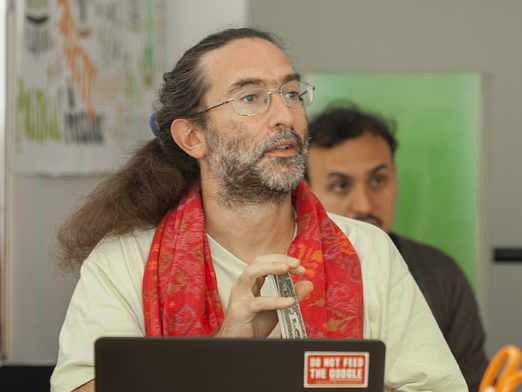In my capacity of voluntary open-source-money-=system engineer, I just returned from a month deep research in Valencia and Catalona, Spain, the country allegedly next in line after stricken Greece, for the proverbial chop.
Spain reports a reported 50% youth unemployment rate, following a massive property bubble crash. Massive property developments lie incomplete or uninhabited. Last year their largest banks joined up into 'Bankia' and sold shares to the middle classes (Our Future Together) and last month the whole edifice collapsed in Fraud, leaving shareholders to take the hit. However shopping Malls in Barcelona are far from empty, agriculture is still functioning, and the beggars are few.
Last year though, while the so-called Arab Spring saw protests achieving very little in North Africa, Spain was having a less lauded democratic revival. Fed up with politics, poverty, Europe, and banking, the people started holding 'Assemblies' of the style later picked up in the occupy movement. Their campanados were camping in the squares long before the 'occupy' meme was seeded. Accross the country They talked and talked and talked. They took police beatings and exposed police provocateurs. They aired grievances, made theories, strategised, marched sometimes, served one other. Then, as the Autumn drew in, it seems many tired of talk and slipped back to their lives.
But these events left their mark on the popular imagination. In January I was contacted by the Catalan Ingeral Coop (CIC). Many coops are using the venerable CES but development has slowed, and they want fully open source software they can control. Drupal looms large in their discussions, but can their one, part-time Drupal expert build a CES alternative before the Euro becomes unusable?
CIC was conceived and is run day to day by Enrique, (the bank robber). During the boom, table tennis champion Enrique rose to prominence by defaulting on a half million Euro mortgage which he had given to good causes. Then he organised a new wifi sharing network in barcelona. Then he put himself at the front line when the police were breaking up the assemblies last years. Now he's a lynchpin of the movement. The Integral Coop is a meta-coop, with the intention that member coops can provide services to one another, as departments in a company - not paying tax, and using an internal accounting measure. The CIC members are all independent, but many use CES and they all want to increase trade between them using credit clearing. Several currency experiments are happening, with varying volumes, softwares, designs. In Barcelona I met several people who understand money systems and are working to implement sound ones! However these are not always the people making the design, strategy and policy decisions! There is a similar scene in Valencia, and a similar Cooperative Integral model, but with only loose coordination between them.
I attended a complementary currency conference in Villanova. The software question is on everybody's lips, and timebanks and coops are looking for opportunities to work with each other. As with the rest of Europe people have time but serious institutional funding is entirely absent. The main outcome of this conference was a new discussion forum and a commitment to building sectoral and governance tools, (such as http://complementarycurrency.org) None of these projects can support a dedicated volunteer professional to do business development, fundraising, or software, nor are they explicity trying.
It is discouraging to see basic mistakes surely being made, but I believe lessons are also being learned. The networks aren't yet large or organised enough to grant themselves serious credit but a range of monetary/accounting experiments are already happening with CES, printed notes or account books. Many projects are grappling with simple mutual credit ideas, or trying to start a 'basic income' currency by paying core salaries, or backing their credit with the foetid but still widespread Euros. One author, Susana Belmonte, author of 'Nada es Perdido', proposes a currency which gets straight to the root; traders would issue credit into the marketplace in anticipation of goods they promise to deliver. This focus on the marketplace is important. The Troc systems of Argentina, (Spanish speaking media covers South Amererica much better than English) and some of the emerging Greek systems are currencies specifically for the physical marketplace.
In Barcelona I found more of the in-kind resources for activists I've been talking about since I went nomadic; wifi, meals, beds. However we must be wise because for every switched on activist there are egoists and misfits looking to sponge attention and resources.

Comments